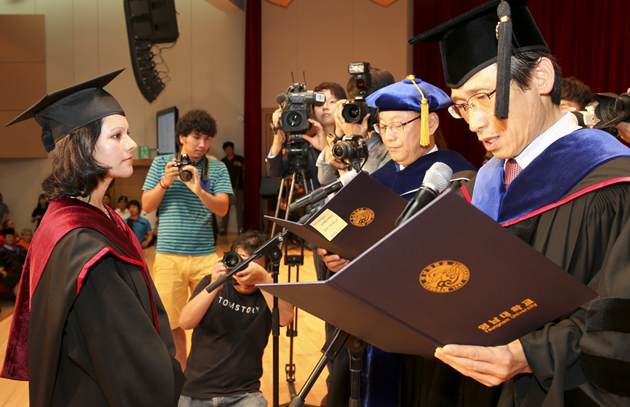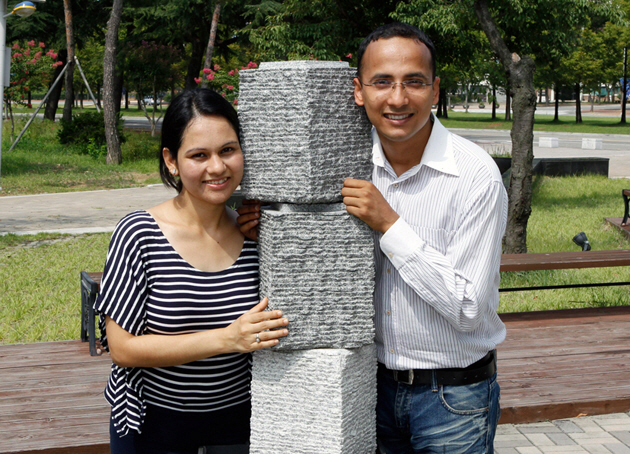Ms. Roka from Nepal who was one of the first students enrolled for the Park Chung Hee School of Policy and Saemaul earns diploma in 1 year and 6 months
Husband, Subedi also earns master's degree in pharmacy at YU
We will change our hometown with 'We can do it!' spirit..."
[August 22, 2013]

YU (President Noh, Seok Kyun) graduated
its world first Master in Saemaul Studies.
Praktisha Roka (26, female, photo) from Nepal was the first to receive her master's at the YU graduation ceremony on the 22nd. Her small figure, dark skin, large eyes, and shy smile gives her a slightly delicate first impression. However, when she talked about her purpose for coming to learn about Saemaul, she appeared to be like 'Joan of Arc'.
She said, "Above all else, I am happy that I am now ready to work for my hometown and my home country." Since enrolling at the Park Chung Hee School of Policy and Saemaul (PSPS) in March 2011, she never skipped a class in Korean offered everyday from 8 to 9 in the morning, and she had a very rigorous schedule with lectures every day. On the first day of every month, she also practiced the Saemaul Undong by working with the 'Saemaul Campaign' that cleans up the YU campus early in the morning.
Of the 15 that she enrolled with and completed three terms in one year, most returned to their home countries for the fourth term to prepare for their theses. However, she remained in Korea to writer her master's degree thesis. This is because her husband Amit Subedi (27) was also working on his master's degree course in pharmacy at the YU Graduate School.
She finally earned her master's degree at the same time as her husband with her thesis titled 'Study on the Effects of the Demographic Features of Nepalese Women for Discrimination, Sexual Abuse, and Work-Life Balance', and thus achieved her goal for studying in Korea.
She was born in a small rural village 12 to 14 hours by car east of Katmandu, the capital of Nepal, but thanks to her parents who were educators, she went to high school in Katmandu. She was shocked at the differences of the city and rural areas, particularly the differences in health and hygiene. Thus, she majored in nursing at the university to go back to her hometown to help per people. After graduating, she worked at her hometown as a nurse. She then taught nursing at university and worked on fostering juniors in her major.
Her first introduction to the Saemaul Undong was in 2009. She read in a newspaper that a person from Nepal studied the Saemaul Undong in Korea and made changes in the city of Chitwan. The article said, 'life has become more convenient by working on the social infrastructure such as widening roads and digging wells' and 'foreign languages such as English and Korean, which are only offered in expensive private schools, are being taught to children of common households, and the quality of life for the Nepalese improved greatly by giving the opportunity to learn about Korean culture such as Taekwondo and Korean dance'. Through this article she said that she wanted to learn more about the Republic of Korea and the Saemaul Undong. Since then, she decided to learn about the Saemaul Undong and said, "Korea's Saemaul Undong is a successful case that can give emerging countries like Nepal the courage that 'We can do it' and 'Let's do it'."
The next work for her is to combine her undergraduate major of nursing and her graduate school major of Saemaul Studies and spread the 'We can do it!' spirit to the people around her and her hometown and carry on with the Saemaul Undong.
She said, "I want to give the opportunity for change and development of Nepalese, and particularly Nepalese women, who are suffering in poor environments." She added, "I learned that the Saemaul Undong and Saemaul Spirit not only developed Korea economically in the 60s and 70s, but also began to tap into the potential of Korean women and to improve women's rights. Nepalese women, who account for half the nation, will also be able to live independent lives through the Saemaul Undong.
She said that she is happy because she has the best supporter in the world. Her husband came to study at YU 6 months before her and recommended that she enroll in the Park Chung Hee School of Policy and Saemaul, and completed her admissions procedure.
Amit Subedi (27) said, "My wife and I are both from rural areas and we always thought that the key factor for the development of Nepal is to overcome the disparities between rural and urban areas. My wife is especially saddened by the extreme prejudices against women in Nepal and always thought of ways to change this. I am happy that she has finally found that way." He explained that he would help his wife spread the Saemaul Undong in Nepal.
Meanwhile, there are 3 who received their master's degrees in Saemaul Studies for the first time in the world at the YU graduation ceremony on the 22nd, aside from Roka such as Men Kung (35), a public official for education in Cambodia, and Orpha Arce Morauda Ⅱ (37), who is a public official of the congress of the Philippines.
 Roka and Subedi pose together at YU prior to their graduation.
Roka and Subedi pose together at YU prior to their graduation.










